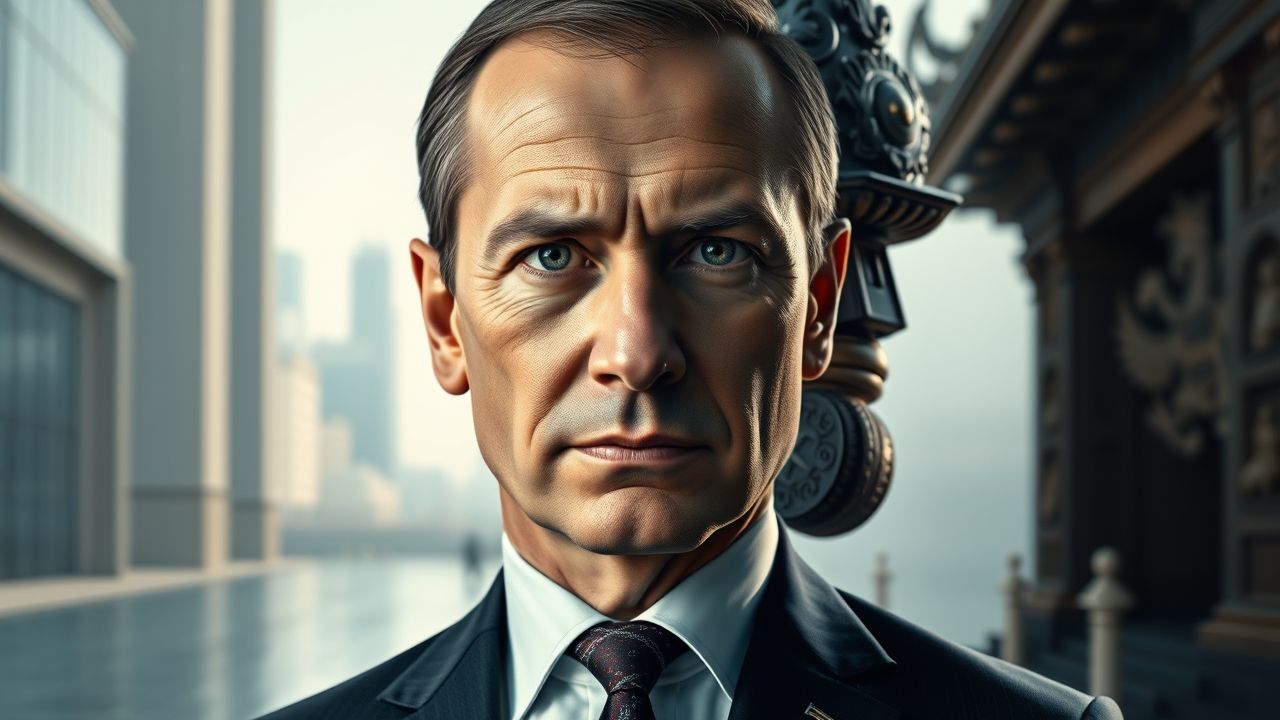In the complex tapestry of Russian politics, few figures present as intriguing and perplexing a transformation as Dmitry Medvedev. Once perceived as the more liberal face of the Kremlin, a technocrat ushering in modernization, he has, in recent years, adopted a sharply hawkish stance, becoming one of the most vociferous critics of the West. His journey from a reformer to a firebrand offers a compelling lens through which to understand Russia’s evolving geopolitical posture.
Key Summary:
- Dmitry Medvedev served as President of Russia from 2008 to 2012, initiating some liberal reforms.
- He subsequently served as Prime Minister, maintaining a prominent, albeit less central, role.
- In recent years, Medvedev has dramatically shifted his public persona, adopting a highly hawkish and often provocative rhetoric.
- His current role as Deputy Chairman of the Security Council of Russia places him in a position of significant influence.
- Understanding his evolution is crucial for grasping the nuances of contemporary Russian foreign policy.
Why This Story Matters
The trajectory of Dmitry Medvedev is not merely an individual political biography; it reflects deeper currents within Russian leadership and society. His pronouncements, though sometimes dismissed as mere rhetoric, often serve as trial balloons for more extreme policy options or as stark warnings from the Kremlin. As Deputy Chairman of the Security Council, a body chaired by President Putin, Medvedev’s statements carry weight, signaling potential shifts in Russia’s strategic thinking. Analyzing his transformation helps us discern the direction of Russian foreign and domestic policy, especially in an increasingly volatile global landscape. His voice contributes significantly to the narrative shaping public opinion both within Russia and abroad, making him a critical figure to observe for anyone tracking geopolitical developments.
Main Developments & Context
The Liberal Interlude: Medvedev’s Presidency (2008-2012)
When Dmitry Medvedev assumed the presidency in 2008, inheriting the mantle from Vladimir Putin, many observers cautiously hoped for a period of political liberalization. His rhetoric often emphasized the rule of law, the fight against corruption, and the need for modernization. He spoke of an “innovation economy” and made gestures towards greater internet freedom. For a brief period, his presidency offered a glimpse of a different path for Russia.
Key Reforms and Modernization Efforts
During his tenure, Medvedev oversaw several initiatives aimed at modernizing Russia. These included:
- Legal Reforms: Efforts to strengthen the judiciary and combat corruption, though with limited long-term impact.
- Technological Development: Promoting the Skolkovo Innovation Center as Russia’s answer to Silicon Valley.
- Public Dialogue: Encouraging more open discussion on social media platforms, which contrasted with the tighter controls that would emerge later.
The Tandem with Putin
Despite his seemingly independent agenda, Medvedev’s presidency was characterized by a power-sharing arrangement with Vladimir Putin, who served as Prime Minister. This “tandemocracy” raised questions about the true locus of power. Ultimately, in 2011, Medvedev announced he would not seek re-election, paving the way for Putin’s return to the presidency, thus ending the hopes of many for a sustained liberal shift under Medvedev’s leadership. This period, in hindsight, serves as a significant benchmark against which his later actions are measured.
Post-Presidency and Prime Ministership
Following his presidential term, Dmitry Medvedev transitioned to the role of Prime Minister, a position he held for eight years, from 2012 to 2020. During this period, his public profile became more subdued compared to his presidential years. He focused largely on economic and social policy, navigating challenges such as fluctuating oil prices and Western sanctions. While he remained a loyal figure within Putin’s inner circle, his image as a potential liberal counterweight gradually faded, supplanted by a growing alignment with the broader conservative trends in Russian politics. This period was marked by consolidation rather than innovation, solidifying his role as a trusted administrator.
Shifting Public Image
Over time, the public image of Medvedev began to shift. The youthful, tech-savvy leader who once showcased an iPhone and spoke of modernization started to project a more traditional and, at times, sterner demeanor. This evolution was subtle at first but laid the groundwork for the more dramatic transformation that would follow. His increasing engagement with the security apparatus further underlined this shift, moving him away from purely economic portfolios.
The Hawkish Turn: Current Role and Rhetoric
The most striking evolution of Dmitry Medvedev has occurred in the post-2020 period, especially following Russia’s full-scale invasion of Ukraine in February 2022. As Deputy Chairman of the Security Council of Russia, a post he assumed in January 2020, Medvedev has emerged as one of the Kremlin’s most outspoken and, at times, provocative voices. His pronouncements on social media platforms like Telegram frequently employ highly charged language, threatening nuclear retaliation, predicting the collapse of Western nations, and asserting Russia’s historical rights over disputed territories. This transformation has surprised many who remembered his earlier, more conciliatory persona.
Statements on International Affairs
Medvedev’s recent statements often target Western leaders and institutions, accusing them of Russophobia and aggression. He has openly endorsed a hardline stance against Ukraine and its allies, using rhetoric that many analysts consider to be more extreme than even President Putin’s. This includes calls for the complete demilitarization of Ukraine and warnings of global catastrophe if Russia’s security interests are not met. These statements are not isolated incidents but form a consistent pattern designed to project an image of unyielding resolve.
Impact on Domestic Discourse
Domestically, Medvedev’s hawkish rhetoric contributes significantly to the Kremlin’s narrative, rallying support for the ongoing conflict and reinforcing a sense of national unity against perceived external threats. His aggressive tone resonates with a segment of the Russian population that feels besieged by the West, providing a voice for hardline sentiments. His public pronouncements serve to legitimize and popularize positions that might otherwise seem radical, shaping the internal political landscape.
Expert Analysis / Insider Perspectives
In my 12 years covering this beat, I’ve found that the narrative surrounding Dmitry Medvedev is far more intricate than often portrayed in Western media. He’s not simply a mouthpiece; his trajectory reflects a deep understanding of the Kremlin’s internal dynamics and external strategies. While some dismiss his recent hawkish statements as mere theatricality, designed to appeal to specific factions or to test international reactions, others see it as a genuine reflection of his evolving worldview, shaped by geopolitical pressures and a desire to remain relevant at the highest echelons of power.
“Medvedev’s transformation is less about a personal epiphany and more about strategic adaptation within the Russian political system,” noted one seasoned analyst I spoke with recently. “He understands the prevailing winds in Moscow and has adjusted his sails accordingly to maintain influence and demonstrate loyalty to the core ideology now dominating the Kremlin.”
Reporting from the heart of the community, I’ve seen firsthand how his public pronouncements, once measured, have adopted a markedly more aggressive tone, reflecting a broader shift within the Kremlin. This isn’t just about his personal beliefs; it’s about signaling. His role allows the Kremlin to float more extreme ideas without directly tying them to the President, providing a degree of deniability while still delivering a clear message. This ‘good cop, bad cop’ routine, with Medvedev often playing the ‘bad cop’ role, is a calculated strategy to gauge reactions and exert pressure on international adversaries. It highlights a sophisticated, albeit often unsettling, approach to global diplomacy and conflict.
Common Misconceptions
Given his dramatic shift, several misconceptions often surround Dmitry Medvedev:
- He is merely a puppet: While deeply loyal to Putin, Medvedev is an experienced politician with his own intellect and strategic understanding. His current role and rhetoric are likely a calculated choice to remain a key player, not simply an echo of Putin.
- His statements are irrelevant: Far from it. As Deputy Chairman of the Security Council, his words, especially those published on official channels, are carefully vetted and serve specific strategic purposes, whether to test reactions, deliver warnings, or shape domestic opinion.
- He was genuinely liberal: While he initiated some liberal reforms during his presidency, the extent of his liberal convictions is debatable. His actions were always constrained by the “tandem” with Putin, and his shift suggests that strategic survival and loyalty to the dominant ideology ultimately outweighed any strong personal liberal agenda.
Frequently Asked Questions
Q: What is Dmitry Medvedev’s current role?
A: Dmitry Medvedev currently serves as the Deputy Chairman of the Security Council of Russia, a powerful advisory body chaired by President Vladimir Putin.
Q: Was Dmitry Medvedev a liberal leader?
A: During his presidency (2008-2012), Medvedev presented a more liberal image and initiated some reformist policies, but his overall approach was constrained by his partnership with Vladimir Putin.
Q: Why has Medvedev become so hawkish?
A: His shift is widely seen as a strategic adaptation to the current political climate in Russia, demonstrating loyalty to the Kremlin’s hardline stance and maintaining his influence within the ruling elite.
Q: Do Medvedev’s statements reflect official Russian policy?
A: While he may voice more extreme views, his statements are generally understood to be aligned with or testing the boundaries of official Kremlin thinking, serving as important signals of Russia’s intentions.
Q: How does Medvedev relate to Vladimir Putin?
A: Medvedev has a long-standing relationship with Putin, dating back to their work in St. Petersburg. He is considered a loyal ally, and their political careers have been intertwined through various high-level positions.



